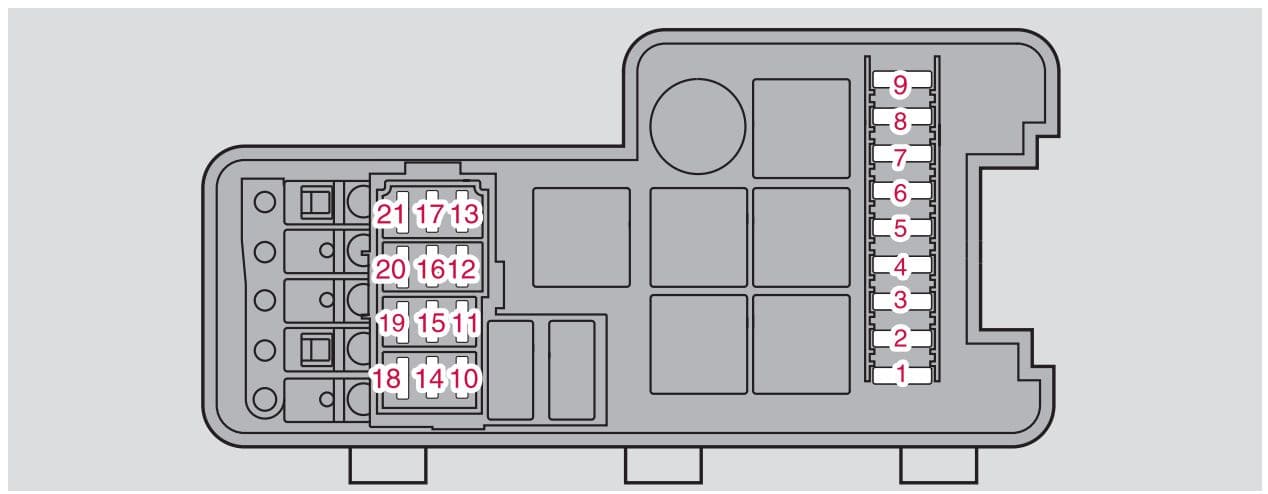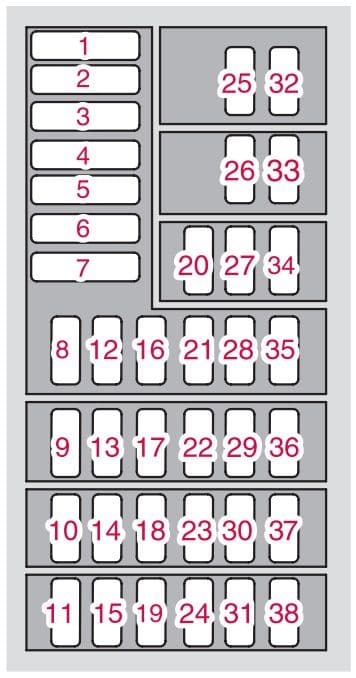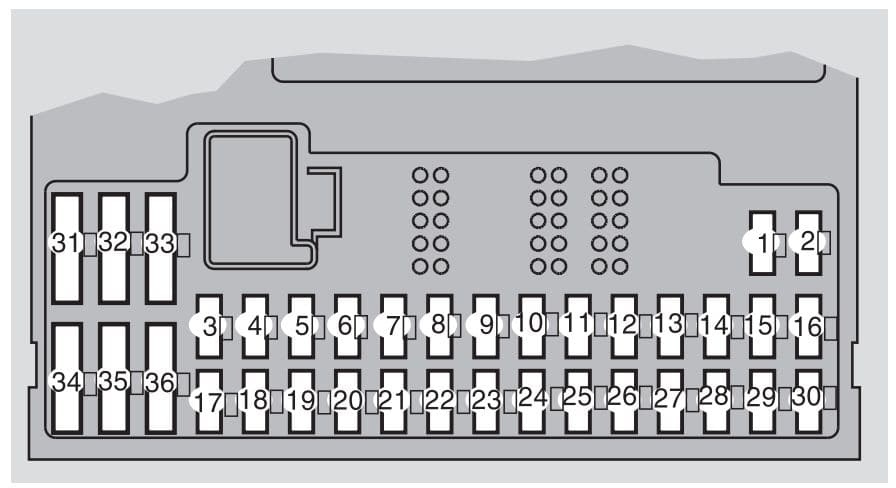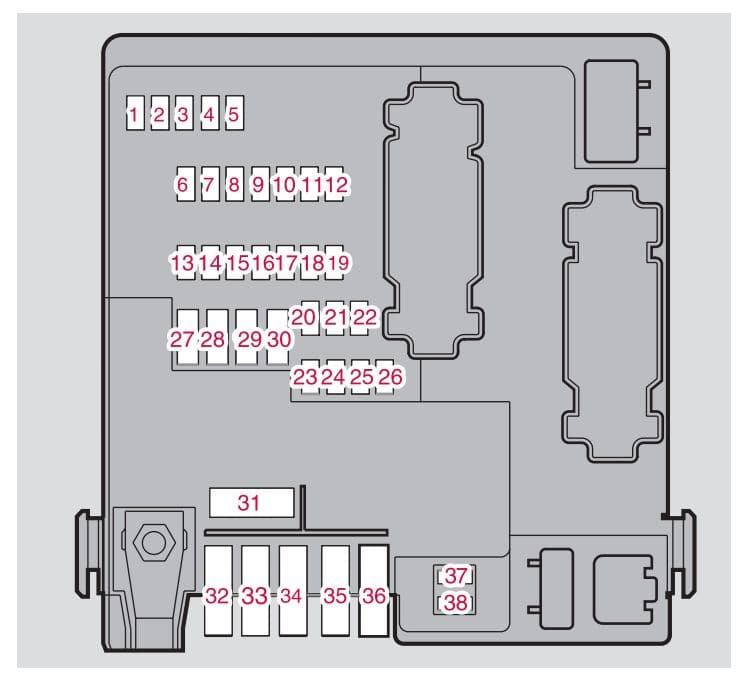Fuses in the engine compartment
| Position | Function | Ampere rating [A] |
| 1 | ABS | 30 |
| 2 | ABS | 30 |
| 3 | Headlight washers | 35 |
| 4 | — | — |
| 5 | Auxiliary lights (option) | 20 |
| 6 | Starter motor relay | 35 |
| 7 | Windshield wipers | 25 |
| 8 | — | — |
| 9 | Fuel pump | 15 |
| 10 | Ignition coils, engine control module | 20 |
| 11 | Throttle pedal sensor, A/C compressor, e-box fan | 10 |
| 12 | Engine control module, fuel injectors, mass airflow sensor | 15 |
| 13 | — | — |
| 14 | Heated oxygen sensor (s) | 20 |
| 15 | Crankcase ventilation heater, solenoid valves (V8), mass airflow sensor (V8), engine control module (V8) | 15 |
| 16 | Driver’s side low beam headlight | 20 |
| 17 | Passenger’s side low beam headlight | 20 |
| 18 | — | — |
| 19 | Engine control module feed, engine relay | 5 |
| 20 | Parking lights | 15 |
| 21 | — | — |
Fuses in the passenger compartment on the edge of the dashboard
Fuses are located inside the access panel on the edge of the dashboard, on the driver’s side
| Position | Function | Ampere rating [A] |
| 1 | Blower – climate system | 30 |
| 2 | Audio amplifier | 30 |
| 3 | Power driver’s seat (option) | 25 |
| 4 | Power passenger’s seat (option) | 25 |
| 5 | Driver’s door – central locking, power windows, door mirror | 25 |
| 6 | Front passenger’s door – central locking, power windows, door mirror | 25 |
| 7 | — | — |
| 8 | — | 15 |
| 9 | Audio, navigation system (option) | 10 |
| 10 | On-board diagnostics, headlight switch, steering wheel angle sensor, steering wheel module | 5 |
| 11 | Ignition switch, SRS, engine control module, immobilizer, transmission control module (V8) | 7,5 |
| 12 | Ceiling lighting, upper electronic control module | 10 |
| 13 | Moonroof (option) | 15 |
| 14 | — | — |
| 15 | — | — |
| 16 | — | — |
| 17 | — | — |
| 18 | — | — |
| 19 | — | — |
| 20 | — | — |
| 21 | — | — |
| 22 | — | — |
| 23 | — | — |
| 24 | — | — |
| 25 | — | — |
| 26 | — | — |
| 27 | — | — |
| 28 | — | — |
| 29 | — | — |
| 30 | — | — |
| 31 | — | — |
| 32 | — | — |
| 33 | — | — |
| 34 | — | — |
| 35 | — | — |
| 36 | — | — |
| 37 | — | — |
| 38 | — | — |
Fuse box in the passenger compartment, behind the plastic cover, driver’s side
This fuse box is located behind the plastic cover below the steering wheel.
| Position | Function | Ampere rating [A] |
| 1 | Heated passenger’s seat | 15 |
| 2 | Heated driver’s seat | 15 |
| 3 | Horn | 15 |
| 4 | — | — |
| 5 | Audio system | 10 |
| 6 | — | — |
| 7 | — | — |
| 8 | Alarm siren | 5 |
| 9 | Brake light switch feed | 5 |
| 10 | Instrument panel, climate system, power driver’s seat, Occupant Weight Sensor (USA) | 10 |
| 11 | 12-volt sockets – front and rear seats | 15 |
| 12 | — | — |
| 13 | — | — |
| 14 | — | — |
| 15 | ABS, STC/DSTC | 5 |
| 16 | Power steering, Bi-Xenon headlights (option) | 10 |
| 17 | Driver’s side front foglight (option) | 7,5 |
| 18 | Passenger’s side front foglight (option | 7,5 |
| 19 | — | — |
| 20 | Coolant pump (V8) | 5 |
| 21 | Transmission control module | 10 |
| 22 | Driver’s side high beam | 10 |
| 23 | Passenger’s side high beam | 10 |
| 24 | — | — |
| 25 | — | — |
| 26 | — | — |
| 27 | — | — |
| 28 | Power passenger’s seat (option) | 5 |
| 29 | — | — |
| 30 | — | — |
| 31 | — | — |
| 32 | — | — |
| 33 | Vacuum pump | 20 |
| 34 | Pump – windshield and tailgate washers | 15 |
| 35 | — | — |
| 36 | — | — |
Fuses in the cargo compartment
The fuses in the cargo area are located behind the panel on the driver’s side of the cargo compartment.
| Position | Function | Ampere rating [A] |
| 1 | Backup lights | 10 |
| 2 | Parking lights, foglights, cargo compartment lighting, license plate lights, brake light diodes | 20 |
| 3 | Accessories | 15 |
| 4 | — | — |
| 5 | Rear Electronic module | 10 |
| 6 | Navigation system (option), radio receiver, rear seat entertainment (accessory) | 7,5 |
| 7 | Trailer wiring (30-feed) | 15 |
| 8 | 12-volt socket in cargo compartment | 15 |
| 9 | Rear passenger’s side door – power window, power window cutout function | 20 |
| 10 | Rear driver’s side door – power window, power window cutout function | 20 |
| 11 | — | — |
| 12 | — | — |
| 13 | — | — |
| 14 | Subwoofer (option), rear air conditioning system (option) | 15 |
| 15 | — | — |
| 16 | — | — |
| 17 | Accessory audio | 5 |
| 18 | — | — |
| 19 | Rear window wiper | 15 |
| 20 | Trailer wiring (15-feed) – option | 20 |
| 21 | — | — |
| 22 | — | — |
| 23 | All Wheel Drive | 7,5 |
| 24 | — | — |
| 25 | — | — |
| 26 | Park assist | 5 |
| 27 | Main fuse: trailer wiring, park assist, All Wheel Drive | 30 |
| 28 | Central locking system | 15 |
| 29 | Driver’s side trailer lighting: parking lights, turn signal | 25 |
| 30 | Passenger’s side trailer lighting: brake light, fog light, turn signal (option) | 25 |
| 31 | Main fuse: fuses 37 and 38 | 40 |
| 32 | — | — |
| 33 | — | — |
| 34 | — | – |
| 35 | — | — |
| 36 | — | — |
| 37 | Heated rear window | 20 |
| 38 | Heated rear window | 20 |
WARNING: Terminal and harness assignments for individual connectors will vary depending on vehicle equipment level, model, and market.



